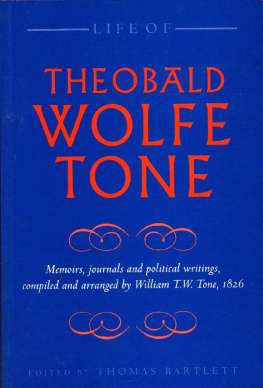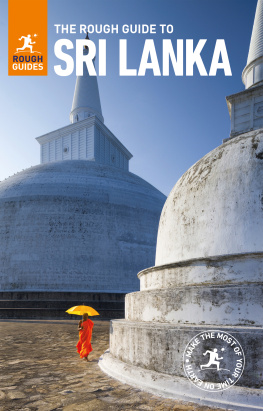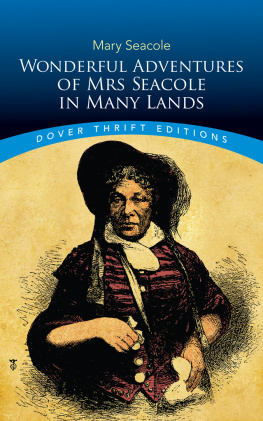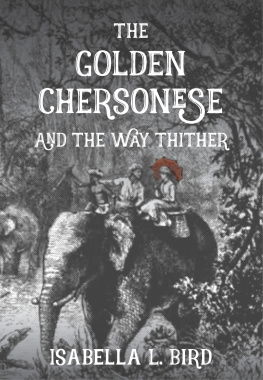LIFE
of
THEOBALD
WOLFE
TONE
Compiled and arranged by
William Theobald Wolfe Tone
EDITED BY THOMAS BARTLETT
THE LILLIPUT PRESS, DUBLIN
Contents
INTRODUCTION
Theobald Wolfe Tone was born on 20 June 1763 in 27 St Brides Street, just behind Dublin Castle, but the family soon moved to 44 Stafford Street (now Wolfe Tone Street), where he spent his childhood; he died in the Provosts Prison, Dublin, on 19 November 1798. These dates communicate the essential fact concerning Tone: he was from first to last an eighteenth-century figure. And within the long Irish eighteenth century (1690-1801), he was quintessentially a man of the 1790s.
The main source for Tones early life is the Life of Theobald Wolfe Tone first published in 1826 in two volumes in Washington, DC, whither his surviving family had moved, and republished here in its entirety for the first time. Theobald Wolfe Tones status as the first Irish republican may be open to question; but the Tones claim to be recognized as the first Irish republican family is surely incontestable.
Tones education was largely unremarkable. He was sent at the age of eight or nine to an excellent English school kept by Sisson Darling and then, at the age of twelve, was enrolled in a Latin school conducted by the Rev. William Craig. Clearly of above-average ability, though very lazy, and very talented at appearing cleverer than he was, a fellowship at Trinity College, sole constituent college of the University of Dublin, was determined upon by his father and his teachers as an appropriate goal in life for him. The young Tone, however, had other ideas.
Peter Tones business had failed as a result of injuries he had sustained in a severe fall, and in 1778 he was forced to sell up in Dublin and return to the family farmhouse at Bodenstown, Co. Kildare. Tone, however, was found lodgings with a friend near the school and stayed behind in Dublin to continue his pre-university education. In this manner, he noted, I became, I may say, my own master before I was sixteen. The result of this freedom might have been predicted. Tone quickly understood that two or three days at school a week would be more than sufficient to keep up with the Rev. Craigs uninspiring lessons in Latin and Greek: the remainder of the week was therefore lawful prize. Together with a handful of friends, he spent his free time walking in the country, going to the seaside for swimming parties, or debating, for even at this early age he had formed a debating society with his companions. Most importantly, perhaps, Tone also reports attending all parades, field days and reviews of the garrison in Dublin in the Phoenix Park. In France years later, awaiting orders to sail for Ireland with an invasion fleet, Tone reflected that his passion for the military life could be traced to his enjoyment of these military displays. Typically, he had also realized that a gorgeous military uniform would prove a decided asset in winning the affections of young women. With Tone, the lofty and the carnal frequently jostled for priority.
By now determined on a military career, Tone was understandably dismayed at the prospect of entering Trinity College; but his father was implacable, and Tones plea to be allowed to enlist in the British army was angrily rejected. Tone could have joined the East India Company army his younger brother William had already run away to enlist in that force but he declined to take this escape route for the truly adventurous. He submitted to his father with a very bad grace, took up his books once again, and managed to enter Trinity as a Pensioner in February 1781. But Tones hankering for a military life had not left him, and he was soon in dispute with his father over the latters refusal to equip me for a volunteer and to suffer me to join the British army in America where the war [of American independence] still raged. A years estrangement from his father (and from his studies at Trinity) resulted, and when Tone for a second time bowed before his fathers will, he found that he had to re-commence his studies in first year. He had already won a medal in his first year of study, but it was upon his return that he gained his reputation of being one of the outstanding students of his generation. By the time Tone graduated in 1786 he had been awarded a scholarship and three premiums.
More importantly, he had won three medals from the College Historical Society.
The College Historical Society was also a social club, and here, especially, Tone was in his element, for he had a enormous capacity for friendship and for fun. He made many friends in the society, such as the future United Irishmen Thomas Addis Emmet, Peter Burrowes and Whitley Stokes; and while his path and that of the likes of William Conyngham Plunket and Charles Kendal Bushe (later Lord Chancellor and Chief Justice of the Kings Bench, respectively) would later markedly diverge, they never lost their affection for him. Against all the odds Tone had been a success at Trinity, and he looked back fondly on his time there: I preserve, and ever shall, he wrote, a most sincere affection for the University of Dublin. However, he was destined not to win a Fellowship: not through lack of ability, but because on 21 July 1785 he had married Martha Witherington, thus rendering himself ineligible.
By that date, although Tone had had a number of sexual encounters or fugitive passions as he calls them, he was by no means sexually experienced.
Shortly after the relationship with Eliza Martin came to an end, Tone had set his eyes on Martha Witherington, then aged fifteen and as beautiful as an angel. After two years futile agonizing over Eliza, Tone was determined to waste no time pressing his suit with Martha. He soon inveigled his way into the Witherington household and, as he wrote, in a short time I proposed to her to marry me without asking the consent of anyone, knowing well it would be in vain to expect it. Martha accepted, and one beautiful morning in the month of July, we ran off together and were married. Predictably, relations with Marthas family were soured by this unexpected elopement, and they remained frosty, by and large, thereafter. Tone never forgave nor forgot the slights he had to endure from the Witheringtons. Many years later, when preparing his fathers papers and journals for publication, William Tone and his mother carefully excised most of Tones caustic comments on the Witherington family and on Matildas brother in particular.
With a Fellowship now beyond him, Tone determined on making a legal career. Leaving his wife (and a child, Maria) to his familys protection, he moved to London in early 1787 to enroll as a student at law on the books of the Middle Temple. But legal study bored Tone and his mind soon wandered to the theatre, to schemes for a military colony in the south Pacific, to journalism, to writing a novel,
The Irish parliament, the object of Tones ambition, was essentially an eighteenth-century institution. Admittedly, it had come into existence in medieval times, but it had only begun to meet regularly in 1692, at first one session every two years, but from 1785 on an annual basis. It consisted of a House of Lords, reserved for the hereditary peers of Ireland and for bishops of the Church of Ireland, and a House of Commons of 300 members 64 representing the Irish counties, two for Trinity College, and the remainder, the large majority, for the 117 boroughs throughout Ireland. A county seat was beyond Tones dreams, but he would have had hopes of one of the less prestigious borough seats, and he would have settled at this early stage for the role of a political advisor to the Whigs. The franchise in the counties was uniform possession of a piece of freehold property worth forty shillings but chaos reigned in the boroughs, which came in all sizes and none (literally, for some had disappeared off the map). In many boroughs, restrictive and frequently bizarre franchises had effectively turned the electorate into a selectorate, with the election of the members typically in the hands of members of the corporation, or freemen, or the local political magnate. Belfast Presbyterians, for example, hugely resented the fact that the representation of their town lay entirely in the hands of the absentee Lord Donegall. So restrictive was the usual borough franchise, and so common the practice of outright ownership, that it was alleged without exaggeration that the Irish House of Commons was elected by the Irish House of Lords. By law, only members of the Church of Ireland or of the Presbyterian Church could vote in elections, if qualified, or take a seat in parliament, if elected. However, while there were many Presbyterian electors, there were few, if any, Presbyterian MPs, for property restrictions on those eligible to stand for election effectively ruled them out hence the Presbyterian interest in parliamentary reform. Catholics, the large majority of the population, could neither vote in elections nor be elected to the Commons (nor could a Catholic peer take his seat in the Lords). None of these restrictions, it may be said, distinguished the Irish parliament from that of Great Britain, or indeed from other, similarly flawed, representative assemblies in continental Europe.
Next page





